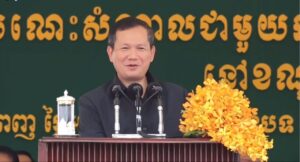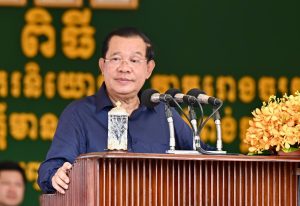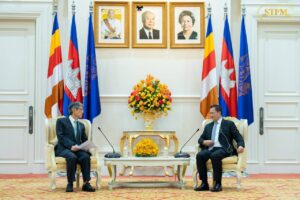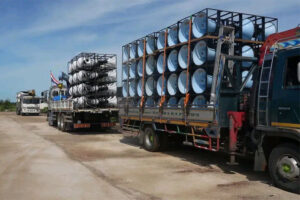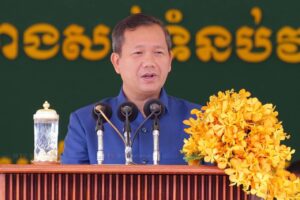Selected Comments of Samdech Thipadei Hun Manet, at the closing ceremony of the 2023 and 2024 work results and 2025 work directions setting of the Ministry of Mines and Energy [Unofficial Translations]
![Selected Comments of Samdech Thipadei Hun Manet, at the closing ceremony of the 2023 and 2024 work results and 2025 work directions setting of the Ministry of Mines and Energy [Unofficial Translations]](https://grandnewsasia.com/app/uploads/2024/12/photo_2024-11-21_17-21-14.jpg) Selected Comments of Samdech Thipadei Hun Manet, at the closing ceremony of the 2023 and 2024 work results and 2025 work directions setting of the Ministry of Mines and Energy [Unofficial Translations]
Selected Comments of Samdech Thipadei Hun Manet, at the closing ceremony of the 2023 and 2024 work results and 2025 work directions setting of the Ministry of Mines and Energy [Unofficial Translations]
[1]
(1) Sawn Stone – the first fruitful solution
The sawn stone sector – is the first solution that I have provided in my term as Prime Minister. In September 2023, I remember going to an exhibition in Nanning (China) […] a sister, who has now confirmed that she is the daughter of Oknha Leng Rithy, approached and whispered to me, “Samdech, maybe you could do something to help us in the sawn stone business. It is facing challenges and closure. Some factories have been closing down.” I asked her why? She said, “There are many problems like the post-COVID-19, and all, but some of the challenges are related to taxes. Our rates are high, plus some other complications” […] upon my return, I formed a committee and assigned the task to Deputy Prime Minister and Minister of Economy and Finance – HE Aun Pornmoniroth, who appointed HE Keo Rattanak as the chairman of the committee mechanism to lead the urgent discussion. There was a strong negotiation over how to lower the tax rate […] I stepped in and offered my agreement to do it. Now, the momentum of the growth of the mining sector […] from September 2023 to September 2024, according to the ministry’s report, went from nearly crashing to growing four times this year, with increasing royalties too. It’s like taking money from the left pocket and putting it back in the right pocket […]
(2) Four factors that make the sawn stone sector successful
I am interested in four factors that make the sawn stone business successful. The first factor is that we had to dare to intervene […]; the second factor is that we have a clear, precise, and strict mechanism to monitor, implement, and help promote implementation […]; the third factor is that all officials must implement honestly and create no further burden on the sector. If we only remove customs rates, but if other relevant officials create a burden, it will still cause the business to fall […] The honest participation of officials in carrying out their duties creating an unnecessary burden helps the private sector on the sawn stone business […]; and the fourth factor is that the private sector itself must participate sincerely and harmoniously […] it must be honest with the state and pay taxes in full. The sawn stone sector has played this role […]
(3) Sawn stone sector is in fact one of the first prides
The sawn stone sector is in fact considered to be one of my prides. If one day, when I retire, I write a book about my experience (of leadership as Prime Minister), perhaps the sawn stone sector will be one of the sectors that I remember. In the meantime, I have also scored many more issues, where they are successes from monitoring mechanism, promoting implementation, working thoroughly and with flexibility, officials working together in honesty, not creating additional burdens, plus the private sector working together honestly […]; let us ensure that this mechanism work not for one year, and have problems next year. Should there be a problem, you can report it to me and I will take it as an urgent task immediately. If there is a problem related to the sawn stone sector, come to me […]
[2]
(4) Stop granting, cancel licenses and downsizing mining operations in the Prey Lang and Kampot conservation areas, and export no construction stone products
I have given the unified principle to be implemented since the establishment of the Royal Government. Firstly, stop granting new mining licenses in the Prey Lang conservation area […], whereas the areas that already have licenses should be reduced because they have been kept without actions for too long […]; a few days ago, I decided to cancel a limestone resource industry license in Kampot Province […] and will keep this site as a place for religious affairs, eco-tourism and cultural tourism […]; and we are pleased to continue the correct policy of Samdech Akka Moha Sena Padei Techo Hun Sen, the former Prime Minister, who determined not to allow the export of construction stone products to save them for the future needs of our nation […]
[3]
(5) Conservation and development must go hand in hand
I gave a principle to (the Minister of Mines and Energy,) HE Keo Rattanak (on) construction minerals. When building a road, we need stones. But let us not quarry every mountain just for every road we need to build. Of course, quarrying mountains for stones reduces the cost of construction, but (we should also study) the cost of damaging those mountains too […] we may be willing to pay a little more, but rather concentrate the quarrying for stone in one place. Don’t scatter it everywhere […] let us study the areas where stones can be extracted, how much we may need for the road, what areas to serve, where to take what resources to serve, for example. This is where we need to promote sustainable development. Conservation and development must go hand in hand […]
[5]
(6) RCAF/Royal Cambodian Police strengthen explosives management for rock blasting with companies
Today, we have the presences of the Commander-in-Chiefs, the Commissioner-General of the National Police, the Commander-in-Chief of the Royal Cambodian Armed Forces. The management of explosives, especially rock blasting, is the issue that need to be absolutely managed […] we must work with companies to be responsible for explosives/dynamite management. Otherwise, it is dangerous. (It is) our national security. The private companies must cooperate and manage this work – both on-site maintenance and transportation, with the Royal Cambodian Armed Forces and the Royal Cambodian Police. They will help inspect, monitor, and look at the storage areas at the companies […]
[7]
(7) Maritime boundaries to negotiate based on the spirit of protecting each other’s national interests
Now regarding issue of demanding and connecting technical and economic issues with politics from extremist groups in both the neighboring country and in Cambodia […] (let me remind that) during my official visit, I announced, with His Excellency the former Prime Minister of Thailand, Srettha Thavisin, at a press conference that “we are discussing the matter.” This is not a new thing. We negotiated from 1995 to 2001 and issued an MOU and have continued to negotiate for economic benefits, and we have not given up the right to negotiate the border issues. Regarding borders, the (Cambodia-Thailand General) Border Committee works on it, and regarding the economy, we negotiate to share the benefits […] no one has ever demarcated the water boundary in that area, since the French era. Though they have demarcated the land boundary. We are trying to negotiate the boundary so that in the future the people of the two countries can live and know where Cambodia’s sovereignty is, where Thailand’s sovereignty is, and where people can open channels to increase their relations. Regarding maritime boundaries, we negotiate based on the spirit of protecting each other’s national interests […]
As far as the OCA (overlapping claim area) issue is concerned, it has nothing to do with losing territory. Politicians should not mix politics with technical issues. The border is resolved based on the law and border technology. When politics is brought up on Facebook, it becomes a different matter […] we are still negotiating. Until we sign an MOU or there is an agreement, then we know where the border will be. We can go see for ourselves where it is lost and where it is left. If we still do not have an agreement, and we are still negotiating, how can we complain? Who should we sue to, and what should we sue for? This morning, Samdech Techo said, “A wound that does not hurt, they take a stick to pick it” […]
The government also loves the country […] let us leave the people of both countries have the benefits of living together. There is no choice to move the countries away from each other. We only have to the choice of strengthening cooperation. This morning, I accept in principle for the Deputy Prime Minister and Minister of Interior, HE Sar Sokha, to negotiate opening the Stung Bot pass (with related Thai authroity) […] for (the trade flow) to continue (growing). That is what is called a cooperation. The two countries, the two people are together. The solution must be implemented according to the principle of non-violence, the principle of law, the principle of technology. Do not incite the people to hate the government, to oppose this country, go against that country, to incite people to fight each other […]
The maritime border has not yet been agreed upon, and we will continue to negotiate. Economic benefits that do not affect sovereignty, if possible, we will do it for the benefit of both our people […] some groups of people want to coo up a story, especially a nationalist one. This border issue is always used to inspire the people. During the water festival, they came out and talked about it again and again in order to gather and mobilize people to protest. As I said, the people did not listen to that. The people come to celebrate the water festival, and not to protest. The people need festive activities […]
Mr. Um Sam An (I did not reveal his name this morning) was a troublemaker […] in 2016, he was imprisoned for forging documents that said a treaty had been signed by Samdech Heng Samrin to dissolve the border between the two countries – Cambodia and Vietnam. In fact, there was no such document. They created fake documents and posted it in social media. He must be punished. In 2018, he asked to be released by writing (a letter of apology) to Samdech Techo […] now he is doing it again […] the DCM (Deputy Chief of Mission) of the US embassy did not come, did he? He (Um Sam An) accused me of corruption when I was admitted to the West Point. He said he was the one to take the exam but I was the one to be selected. May I remind him that this was a matter of American procedure, and he should be careful not to curse the Americans […]
As for his boss, he sits around and only mentions about the Bangladesh successful formula. I don’t care which country they are talking about, but they should monitor the situation […] he liked to create a movement abroad and did not recognize the elections […] now there is a desire to create another government in exile abroad. Is this legal in a democratic country? Whatever he and his people do, I am begging that they don’t come and incite action like what they did on August 18 – organized a violent uprising against the government. Please don’t use all this to incite the people to misunderstand the situation and push (for demonstrations) to burn down the country […]
What I am saying is to ensure harmony based on real information. Please do not promote fake news, incitement, and especially illegal activities like on August 18. Cambodia has been through 500 years of war […] and trying to bring politics into things like the OCA negotiations, border issues, etc., is dangerous. I appeal to the people to have a clear position, to understand clearly the reasons, and the government’s efforts to protect national interests. Whether the OCA negotiations are for economic benefits, protecting the territorial integrity of our waters and land, or promoting cooperation, developing the country, and good cooperation with friends – these are the good point of the government […]
[9]
(8) Oil refining location consideration so as not to affect the environment and other potentials
If there is a petroleum refining operation in our country, it is good, but you must consider the location clearly, where to keep it for petroleum, petrol chemical, etc. Think about it. Don’t put it everywhere. Locate it near to the port, or near something else, etc. Otherwise, this or that person will ask to put it here and there and if we do it for a long time, after 20 years, all the places will be chemical sites, petroleum sites, what else will be left […] [lease evaluate for me what are the benefits and disadvantages of placing one there. How are we going to readjust it? […]
Now I am giving no more beer licenses. We already have seven of them. If it is produced for export abroad, I would consider, but if they do it for local market, I will not give them anymore […] we have to advise interested parties not to do that, it won’t work. We must dare to make them understand that our market is limited […] I advise thinking about car assembly factories. Now there are many. With this size of market, how many car assembly factories are needed? If we give licenses too many, those who already have them may not grow […] we have to make sure those who have (licensees) grow […]
I hope that this promotion (of oil refining plants) can be done. Promoting the production of more raw materials, not only in the energy sector, but in other industrial sectors, that I have recommended, needed to do more. Cambodia is not a place where all finished products are consumed, but we can have the ability to process raw materials […]
[9] 23 clean energy development projects with a total capacity of 5,950 megawatts approved
The Royal Government has approved 23 energy development projects with a total capacity of 5,950 megawatts […] currently, (we have) 62% of our energy from clean sources […] and will increase to 70% by 2030 […] standing 2nd in ASEAN […] in these 23 projects, we have solar, hydroelectric, wind, biomass, and energy storage projects […] for each project, we have negotiated the price (of energy production) to as low as possible. Even some world institutions say that it was not possible. For example, 3.8 cents for solar. In developed countries, it costs 6 cents. Unless the investment company agrees to produce and sell to EDC for 3.6 cents (they would not receive approval.) we negotiated for such a price so that EDC can distribute it further at a low price to the people […]
[13]
(10) Energy-efficient technology and citizen consumption pattern help reduce energy consumption
Let us study new (energy-efficient) technologies to reduce costs […] private sector participation can import products and technologies that use less energy, plus citizen consumption (pattern). This is not just the government’s job. In order to reduce energy costs, citizens have to exercise thrifts to save money […] we work together to reduce consumption and energy, because if we reduce our use, and leave the rest for others, the total cost can be deducted […]
[14]
(11) Draw more benefits from green energy sources
The Ministry of Environment reported to me the other day that we have this REDD+ project (Reducing emissions from deforestation and forest degradation in developing countries), and we sell and make about USD 6 million just in the three areas of the environment protection in Keo Seima, Pursat in the south and Phnom Kravanh, and in Prey Lang. We are studying 12 more places. All this money can be poured into the community […] I ask the Ministry of Economy and Finance, the relevant ministries, to help put a telescope to look for more places. Sometimes they are there, but we don’t know yet […] we play the role of a member country of the world that is proactive. Let us draw benefits back, especially from our participation in the dedication to protect the environment. In this, I see that the Ministry of Environment is doing a good job […] I hope that the Ministry of Mines and Energy is involved. That has to do with finance, the Green Finance thing […]
[16]
(12) EV is no longer the future but the present
I have issued a policy that “hands over the installation of the power charging station to the Ministry of Mines and Energy. The Ministry of Public Works and Transport will look into matter of vehicle technical inspection […] the EV related policy is led by the Ministry of Mines and Energy […] I urge that both ministries and the relevant committees and institutions continue to move forward because EV is no longer the future. EV is now the present […] EV are coming in. They are being used in the city, and there must be a place to control them. There are policies that have been issued to control technical standards, which is important, in addition to the code. We are working on this. These points related to the energy sector are principles for the ministry to continue to lead its own prioritized sectors[…]./.


